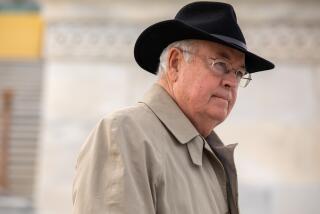Ex-Starr Aide Cleared in Lewinsky Story
- Share via
WASHINGTON — Charles G. Bakaly III, a former Los Angeles lawyer who served as chief spokesman for ex-Whitewater independent counsel Kenneth W. Starr, was cleared of criminal contempt charges Friday for allegedly lying to a judge about his role in a controversial news story relating to the Monica S. Lewinsky investigation.
The acquittal was handed down by Chief U.S. District Judge Norma Holloway Johnson, who presided at a four-day trial without a jury in July. Bakaly was prosecuted by the Justice Department for allegedly concealing his involvement in a New York Times story about Starr’s authority to indict President Clinton.
Johnson, in her written ruling, said she concluded that “the government has not proved its charges beyond a reasonable doubt and therefore the court finds that Mr. Bakaly is not guilty of criminal contempt.”
The front-page article, published as Clinton’s Senate impeachment trial was in its early stages last year, quoted unnamed “associates” of Starr as saying the independent counsel believed he had authority to obtain an indictment of Clinton while he still was president.
The story elicited an uproar from the White House and accusations from David E. Kendall, Clinton’s private attorney, that Starr had leaked the story to influence senators deliberating Clinton’s fate. The Senate ultimately voted that there were insufficient grounds to remove Clinton from office based on House-passed charges of perjury and obstruction of justice.
Johnson demanded an investigation by Starr’s office after Kendall filed a formal complaint. Bakaly subsequently submitted a sworn affidavit to Johnson, prepared by a Starr lawyer, declaring he had provided “no information” to a reporter.
But after initially denying he was responsible in any way, Bakaly later acknowledged in a series of FBI interviews that he had met with the reporter, Don Van Natta Jr., three times and had 24 phone conversations with him. He said he provided background guidance and gave the reporter an internal memorandum from Starr’s office that discussed legal arguments of Watergate prosecutors in the 1970s about whether Richard Nixon could be indicted while in office.
Starr fired Bakaly in March 1999 upon learning of his deeper involvement. Starr himself left office last October and was replaced by a top deputy, Robert W. Ray.
At his trial, Bakaly said the court affidavit that bore his signature was technically true but had been written in oversimplified language. He said the statement in this affidavit that he had provided “no information” meant no secret grand jury information, which would have been a serious offense.
Ray said Friday that, although Bakaly’s actions were not authorized, they “did not violate rules prohibiting disclosure of grand jury matters” and that his office “accepts the judgment of the court.”
Johnson, known as one of the court’s most deliberative jurists, handed down her verdict 2 1/2 months after the conclusion of Bakaly’s trial. Elaborating on her verdict in a 50-page ruling, she said:
“Even if some of his statements are misleading . . . such a finding does not provide a sufficient basis for a criminal contempt conviction for making false statements.”
If convicted, Bakaly, 44, could have received a six-month prison term and faced possible disbarment. He told reporters after the verdict: “I feel a lot better than I have in a year and a half.
“I got a chance in this trial, finally, to talk directly to the judge and have her see me and judge my credibility,” he added. “I’m just going to move forward.”
Federal prosecutor Alan Gershel, in arguing for a guilty verdict at Bakaly’s trial, told the judge that Bakaly’s flat denial of involvement in the newspaper story “obstructed the administration of justice” as investigators looked into the source of the leak.
In a statement Friday, the Justice Department said it began a probe only after Starr’s office referred the matter to it. The department said it concluded that “Mr. Bakaly should not be indicted” but that the matter “could best be addressed through the district court’s already pending contempt proceeding.”
More to Read
Sign up for Essential California
The most important California stories and recommendations in your inbox every morning.
You may occasionally receive promotional content from the Los Angeles Times.










